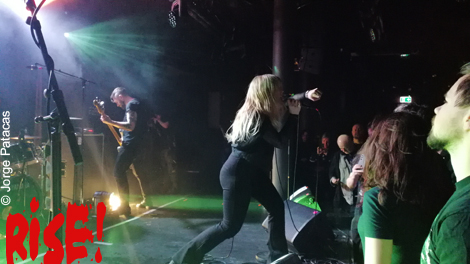
Moonspell has recently toured Europe together with Rotting Christ and the Swiss outfit Silver Dust. One of the stops was Oslo, Norway, and RISE! was there, so it was a great opportunity to meet the keyboardist/guitarist Pedro Paixao and discuss their latest album “1755”, the new biography book “Wolves Who Were Men”, his personal opinion on the music business as well as many other topics, even memories from their childhood!
RISE!: – You’ve just released a new biography book called “Wolves Who Were Men”. How did you come up with this idea? Can you tell us a bit of what the fans can find in the book?
Pedro Paixao: The idea came from Fernando (Ribeiro, vocalist) who thought that it would be a good time to have a biography, because we have so much history to share. And I think there was also a silent fan demand on it. Eventually he met the right person to write it, he didn’t want to do it because it would be a bit strange to write a biography of the band, of a group of people, written by one of them. That’s a different story. We really wanted somebody from outside, so when he met this person, he invited him to write the book. It was first released in Portuguese obviously, it went very well. It’s really well-written I have to say, it’s very nice.
In the first chapters you will find mostly the metal scene. It’s more like a social context realization, so you understand how Portugal was, how Lisbon was and how Heavy Metal was there, you know? And where did Moonspell emerge from. The very origin. That takes about two to three chapters. And then the characters, the persons that were involved start to show up slowly and slowly, and eventually it’s no longer a social report, it turns into kind of a romance. So I think overall it’s really well-written, we’re very happy to release it in English finally. And the curiosity is that it was my sister who translated the book (laughs). Because she’s bilingual and a translator as well, so things came together for a coincidence and now all the fans can have our biography with no filters.

R!: – What are the differences between this book and the one called “20 Years” released in 2012?
PP: That was more of a photo book and it’s written by Fernando, so that’s his perspective on certain history of Moonspell. But it’s not a book that goes through all the history, it’s more like photo and characterization of the persons or the agents in our career. There’s a chapter about Portugal, a chapter about me, about the foreign conquer. It’s not really a biography, it’s more like the meaning the things had to Fernando.
R!: – Your latest album “1755” tells the story of the Lisbon earthquake from that year, why do you think it was the right time to put out a concept album like this?
PP: I think any time could be a good time to put out an album like this. I think the idea could have worked in 1997 or 2005. The thing is that Fernando always wanted to have one record about this, since ever, so it could have happened before. I think what defined the timing of this album is the fact that it’s all in Portuguese and in earlier stages it would have messed up a bit maybe, so we never took it in consideration. Then we had a project who was me, Fernando and a singer from another band in Portugal called Bizarra Locomotiva. Fernando got a proposal from the radio to do just an EP, so he invited me and this other singer, so I made the music and they had poems from a very famous Portuguese writer, and the project was called Orfeu Rebelde. It was in Portuguese obviously because the poems were in this language, and it went so well that it gave us a little bit of clue that it would work and we should do it. So I think that defined the timing of this work.
R!: – The album also features a cover of Os Paralamas Do Sucesso. Why did you decide to include this one and how do you think it fits with the rest of the album and the general concept?
PP: Easy. First, people must understand that Portuguese culture in our generation is highly influenced by Brazil. So all this 80’s and 90’s music from Brazil is quite well-known in Portugal. This song in particular is not too known there, they know the melody, but it’s not super popular. The choice was both artistic and strategic. I mean, we wanted to cover something from Brazil, it’s unexpected and we always like these challenges. In the past we covered Madredeus which is a very traditional Portuguese band, and we did a metal song out of it. Now we did it with this Paralamas Do Sucesso song.
We chose this song because of the lyrics, they have to do with earthquake and tsunami, it tells the story of these lamps that the wives would put on the harbours, on the shores near the sea, so that their husbands could see their way home. The lyrics are excellent, I mean, you wouldn’t expect from Paralamas Do Sucesso to have these deep lyrics, so it fit really well.
In the beginning, me and Ricardo (Amorim, guitars), looked at Fernando and thought it was another crazy idea, but eventually Ricardo started to work on it and he did a really good job on that one, because he picked up the song and then it was just a question of me and Fernando telling him to make it slower, more of a doomy song.
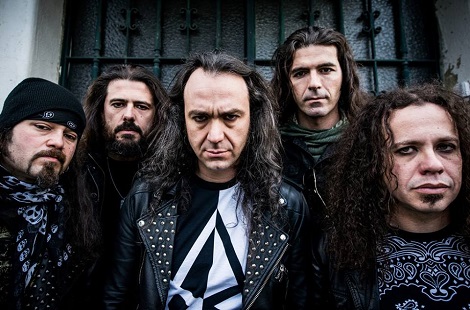
R!: – There’s a bonus track which is a Spanish version of the song “Desastre”, how comfortable was for Fernando to sing in Spanish?
PP: It wasn’t comfortable. I mean, he wanted to do it, that’s not the question, but it takes a little while. I remember that first we recorded it and it was ready, the producer took the recordings to the studio to mix it, but we decided to re-record it and replace the other one because a lot of words weren’t really well pronounced. So we contacted also a Spanish friend to correct any inconsistencies that we had and also to help a bit on the pronunciation. I don’t know how it came out for a Spanish…
R!: – Actually it’s pretty good.
PP: Ok, good to know! We were careful at least, we didn’t want to take it in a wrong way, so I think it was good that we demanded more.
R!: – Do you know what was the reception on Spanish speaking countries?
PP: First and foremost, “1755” album surprised us in a way that it actually got better reactions than “Extinct” (2015) on countries that are not so familiar with Portuguese. For a Spanish speaking person, if you look at the lyrics, you can read at least 60%-70% of it, and you can actually relate to most of the sentences and the rhymes, but it’s not the same for a British or a German person for example. Still they enjoyed it a lot. Same happens to me when Rotting Christ goes on stage and sing in Greek, I actually prefer it a lot more than when he sings in English. Surprisingly that happened to us.
Now, it’s cool that we play that song in Spanish in Spain or South America, but it’s only there that we feel more reaction, I can’t say that there was a huge reaction on it.
R!: – This year marks the 20th anniversary of “The Butterfly Effect”. It was an experimental album at the time, how do you see it nowadays?
PP: You know? I wrote most of the stuff there. If you read the book, you will realize what happened at that moment in the band. There were many changes, Ricardo was facing some personal trouble, he was a bit distant, not that present. We didn’t have a real place for drums to be a part of the composition, then there was me and the bass player at the time, Sérgio, that wrote all the music. Still today, when I look at the album, I think there are some good ideas, some great songs and some great concept behind it. I love the cover, the layout, the whole thing, but I miss the band there, I miss the influence from the other guys. I can write music by myself, but that’s not Moonspell, I always want to have input from the other guys, at least from Ricardo because it’s not like you always have the privilege to work with such a talented musician.
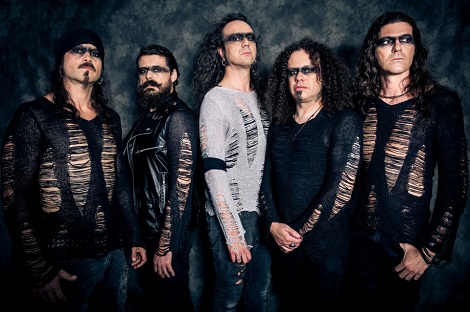
R!: – What do you think is the best and worst part of being in the music business these days?
PP: That’s a very individual question. It’s hard for me to answer for the band. But what affects me negatively is the fact that metal is starting to make fun of itself in a bad way. I really don’t think it’s normal that these party/comedy bands making fun… I mean, I always liked Tankard, that’s ok, but you cannot have ten Tankards of the size of Amon Amarth! That’s a bad sign, it’s a sign that people are not looking for art, but for entertainment. They’re both necessary, I’m not against the bands to do it, but the business is changing in that way. It’s more entertainment and less art.
On the other hand, it’s more democratic now because there are not so many big bands, you know? But there are a lot more of small bands, lots of options, so I think there’s a lot more choices for a listener. Now the question is, what do they do with that? I mean, if they keep on listening half a song in Spotify and then change it to another, then eventually it’s gonna be Britney Spears disguised in metal, you know? Nowadays we already have bands that are more products than bands, but I just say this with nostalgia because times rule the world, we cannot own it and changes will always happen and we’ll always miss what was good about the past. Sometimes you have to think what was bad about the past as well. So I think new eras bring new challenges and I don’t mind to adapt to it. Of course there are things I’m sorry for, but I have my vinyls, so… (laughs)
R!: – You’ve been to a lot of places over the years, is there still any place that you would specially like to visit?
PP: With the band we’ve never been to Japan and I would like to go there. But my ambition is very tiny regarding a lot of things. I was just in a bar with a friend of mine in Oslo on a regular Wednesday, what about that privilege? I got conscious of this five years ago or something, because before I’ve always seen the work side of it, still had some fun but not conscious. I still would do the same, but I wasn’t conscious of how unique this can be in your life. You hear experiences from people living in different climates, societies, food… you always learn a bit, I find it most interesting. I don’t say that I want to go to more places with the band, but I personally would like to go to Africa. I would like to go to Angola, Sao Tomé… these places that were former Portuguese colonies. Everyone has kind of a family relation to Africa, so I would like to go to the sub-saharan Africa, would like to see that.
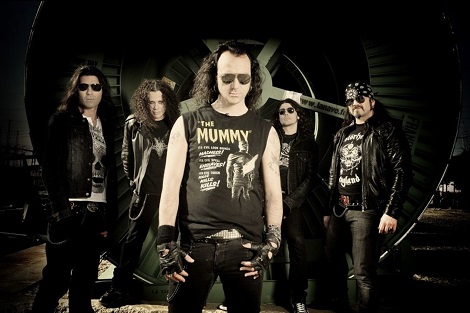
R!: – How was it to grow up in Lisbon? What’s your fondest memory from your childhood?
PP: I didn’t grow up in Lisbon actually. I grew up in a city called Coimbra, it’s the second oldest university in the world, it’s a student town. It’s very quiet… I mean, there’s nightlife, but I was a kid. It’s safe, so I would play on the streets, I had a wonderful childhood. My family is from the south of Portugal, so as soon as we had vacations, I would go to the beach for four months and stay with my grandparents. They were tough, military. Portugal had a revolution in 1974 that brought down a fascist dictatorship, then left wing tried to take over the country, but we eventually got to a very healthy democracy and I grew up in the years where it was a brightful country, but always in crisis. So people were happy to be free, but very unhappy because there was no order. Now things are getting into place. So it wasn’t easy for most of my colleagues. For instance, I can tell for Fernando, he grew up in a suburbian clandestine neighborhood where people would build houses at night and his parents were already the second generation coming there to rent an apartment. Yeah, you can say it’s a building, but it’s the minimum. They had tiny space to live and when I met him, I was 17 or 18, and he was this black dressed guy who looked like a witch or something with a big medal and long hair, very stylish and beautiful like a prince. And he was a really good student as well. He was always carrying philosophy books.
I had another friend who was a bit like this that also came out from this neighborhood, but he’s now working for the Communist Party. He’s also a philosopher. You know? Third of the people from there got lost in drugs, others escaped from drugs and had shitty jobs, then the other third part were just regular guys, poor guys who studied a bit, but maybe do shit on the streets, and then some would fight for knowledge and better conditions and Fernando is one of these cases. Ricardo has had a regular life like me, his father started to work very young at 13, then studied later as an adult, he took law in the university, but in certain time of his life he even studied in a private school, so he had better conditions. He’s like me, middle class, it was hard but very good as well. We had good memories from childhood in Portugal, it’s a good country.
R: – What’s next for Moonspell after this tour?
PP: Ha, we explode! (laughs). And then we make sure that the ashes are scattered far away from each other… (more laughs). We’ve been working on a new album for 2020, but we don’t want to reveal too much about it, we’re taking it very easy. We don’t even want to say in what stage it is.
R!: – So you cannot say if it’s going to be in English or Portuguese again then…
PP: I know, but I just don’t want to tell, it’s not our way of working. We decided it and keep it this way. News will come on the right time and we don’t want to think that much about it. Other than that, we have a couple of festivals in 2020. Moonspell has been quite active during the last years and I think it could be like that for a few more years, but let’s see, life is very surprising. I could fall on the street, break an arm and what about today’s show? What do you do?
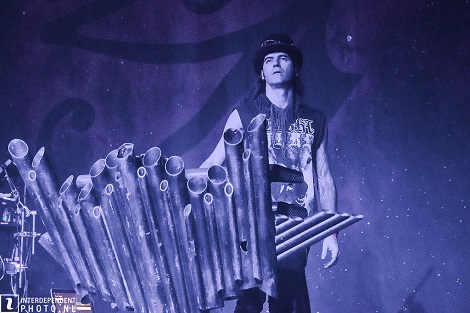
R!: – Hopefully not!
PP: Well, with this ice outside, probably yes… (laughs) (Note: there was melting snow on the street, so it was very slippery and easy to fall if you were not careful enough). But fortunately, I’ve even been run over by a car and never broke a bone, I didn’t even get injured. I’m a really lucky person, so probably nothing will happen until I die… and I’ll be lucky even then maybe, just having a sudden death! (laughs).
Life in Moonspell is always depending on very few details… I usually say we’re like a marriage. No one can imagine how it is, because you don’t wake up with this person, you don’t speak with bad breath to this person, so if you’re not there, you don’t know how it is. That’s a bit what happens in a band and sometimes details get in the way, we never know, it’s always a risk, you know? It’s like a couple, you always have to work on this relationship.
R!: – But it’s been working for a long time.
PP: It’s a long time, yeah. I’ve been also married for 23 years, so maybe I’m an expert! (laughs). I should do consulting speeches. Me or maybe my colleagues, but I’m actually the one who’s been married for more time, by far.
R!: – Obrigado for the interview!
PP: De nada! No problem!
MOONSPELL DISCOGRAPHY
Wolfheart – 1995
Irreligious – 1996
Sin/Pecado – 1998
The Butterfly Effect – 1999
Darkness and Hope – 2001
The Antidote – 2003
Memorial – 2006
Under Satanæ – 2007
Night Eternal – 2008
Alpha Noir – 2012
Extinct – 2015
1755 – 2017
MOONSPELL VIDEOS
“Opium” (1996):
“Nocturna” (2001):
“Everything Invaded” (2003):
“Night Eternal” (2008):
“Lickanthrope” (2012):
“Extinct” (2015):
“In Tremor Dei” (2017):

